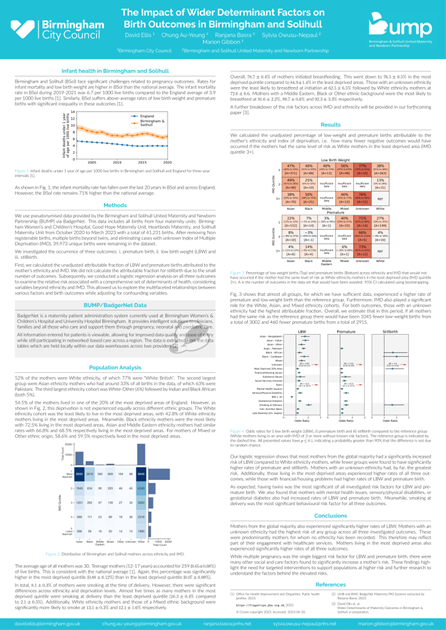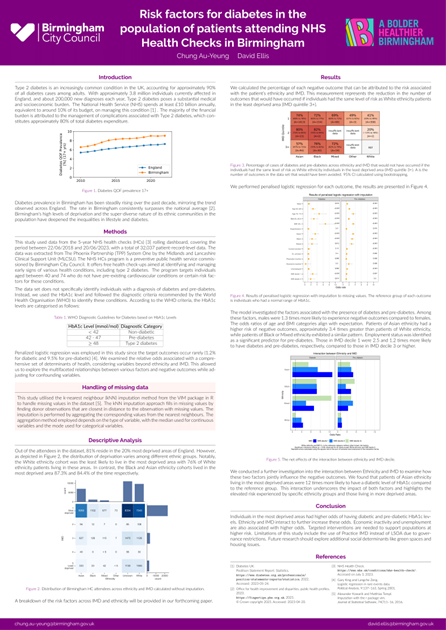
Developing Our Understanding of Risk Factors for Diabetes and Birth Outcomes In Birmingham
We have undertaken in-depth analyses of local data to better understand two health outcomes for Birmingham residents. In two separate pieces of work, we have looked at what increases the risk of i) diabetes and ii) adverse pregnancy outcomes. Rates for both of these outcomes are higher in Birmingham than across England:
- Diabetes prevalence in Birmingham has been steadily rising over the past decade, mirroring the trend observed across England. However, the rate in Birmingham has been consistently higher than the national average.
- Adverse pregnancy outcomes include infant mortality (baby dying in 1st year of life), low birth weight and premature birth and the rates for these are all higher in Birmingham than the national average.
We have been working to determine which factors increase a person’s risk of these two outcomes. Our statistical analysis is summarised in the following two posters which can be viewed in full using the links:
- Risk factors for diabetes in the population of patients attending NHS Health Checks in Birmingham
- The Impact of Wider Determinant Factors on Birth Outcomes in Birmingham and Solihull
Our work highlights stark health inequalities in these outcomes. Those living in the most economically deprived areas and those from the global majority (also called ethnic minority groups) are significantly more likely to develop type 2 diabetes and are also more likely to experience adverse pregnancy outcomes. For example, Black Caribbean mothers had twice the odds of stillbirth compared to White mothers.
For those who are both from the global majority and living in the most deprived areas, the situation is even worse. For example, we found that in the last 5 years, patients of Asian ethnicity living in the most deprived areas had a 10 fold relative risk of diabetic blood glucose level than patients of White ethnicity living in the least deprived areas.
This work will play a central role in helping Birmingham Public Health, our partner organisations and communities to understand and address the causes of these outcomes and inequalities. It is therefore important to share these results as widely as possible. That’s why we were proud to present these posters at the Health and Care Analytics Conference 2023.
Our full analysis for both these projects is currently being written up for publication.
We would like to thank the Birmingham and Solihull United Maternity and Newborn Partnership (BUMP) and the Midlands and Lancashire Clinical Support Unit (MLCSU) for providing their data and expertise that made these projects possible.
Author: David Ellis and Chung Au-Yeung, Population Health Management team, Public Health, Birmingham City Council.


 Birmingham SEND Briefing Book
Birmingham SEND Briefing Book



